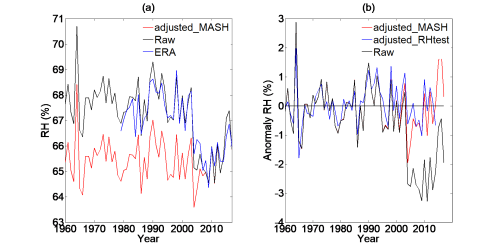Surface relative humidity (RH) is a key element for weather and climate monitoring and research. However, RH is not as commonly applied in studying climate change, partly because observational series of RH are prone to inhomogeneous biases due to non-climate changes in the observation system. It is an important issue to quantitatively estimate the influence of inhomogeneity on RH series and accurately evaluate its long-term trend based on homogenized data.
In a recently published study in Advances in Atmospheric Sciences, an international team from China and the UK developed a homogenized dataset of daily RH series from 746 stations in the Chinese mainland for the period 1960–2017, called ChinaRHv1.0. They analyzed the inhomogeneities in daily RH records and estimated the long-term trends in recent decades in China. The results indicated that most (685 or 91.82% of the total) station time series were inhomogeneous, with one or more break points.
"We found the major breakpoints occurred in the early 2000s for many stations, especially in the humid and semi-humid zones." Said the lead author Dr. LI Zhen with the Institute of Atmospheric Physics at Chinese Academy of Sciences, "It's due to the implementation of automated observation across the country. The inhomogeneous biases in the early manual records before this change were positive relative to the recent automatic records, for most of the biased station series."
The team found there were more break points detected by using the MASH (Multiple Analysis of Series for Homogenization) method, with biases mainly around -0.5% and 0.5%. These inhomogeneous biases were adjusted with reference to the most recent observations for each station.

(a) Regional average of annual mean relative humidity series for China during 1960–2017 based on raw data, the adjusted data based on MASH, and the reanalysis data of ERA5 (a constant of 7% is added to facilitate comparison). (b) Anomalous AMRHS based on the raw data and the two adjusted datasets based on MASH and RHtest.(Image by LI Zhen)
Based on the adjusted observations, the regional mean RH series of China showed little long-term trend during 1960–2017 [0.006% (10 yr)-1], in contrast with a false decreasing trend [-0.414 % (10 yr)-1] in the raw data. It is notable that ERA5 reanalysis data match closely with the interannual variations of the raw RH series in China, including the jump in the early 2000s, raising a caveat for its application in studying climate change in the region.
Reference
Li, Z., Z. W. Yan, Y. N. Zhu, N. Freychet, and S. Tett, 2020: Homogenized daily relative humidity series in China during 1960–2017. Adv. Atmos. Sci., 37(4), https://doi.org/10.1007/s00376-020-9180-0.
